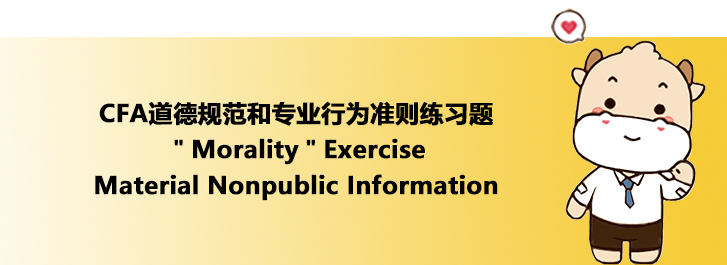CFA道德规范和专业行为准则练习题
"Morality"Exercise:Material Nonpublic Information
 Questions 1:
Questions 1:
Mailaka Securities(MS)advertises the use of a“bottom up”investment style in its marketing material.Recently,MS senior management decided to switch to a“top down”approach,citing the fact that it is less labor intensive.All other aspects of the research process are to remain the same.The head of research at MS,Mara Cherogony,CFA,is instructed to supervise the implementation of the new procedures,notify clients of the changes,and revise the text of mar�keting materials when new material is produced.Which of the following CFA Standards pertaining to Investment Analysis,Recommendations,and Actions is Cherogony least likely in danger of violating?
A、Supervisory Responsibility
B、Communication with Clients
C、Diligence and Reasonable Basis
【Answer to question 1】C
【analysis】
C is correct because research can still be considered diligent and having a reasonable basis if done using a“top down”research methodology as opposed to a“bottom up”methodology.By not communicating to prospective clients the change in the invest�ment process through the delay in the creation of new marketing material,however,Cherogony violates Standard V(B)–Communication with Clients,which requires mem�bers and candidates to disclose to clients and prospective clients the basic format and general principles of the investment processes they use to analyze investments,select securities,and construct portfolios and must promptly disclose any changes that might materially affect those processes.As a supervisor,Cherogony is responsible for ensuring compliance with the Code and Standards.
A is incorrect because by delaying the change in the marketing material until the inventory is depleted,there is a possibility that the new investment process policy will not be clearly communicated to prospective clients.As a supervisor,Cherogony is responsible to ensure the compliance with the Code and Standards.
B is incorrect because Cherogony violates Standard V,which requires members and candidates to disclose to clients and prospective clients the basic format and general principles of the investment processes they use to analyze investments,select securities,and construct portfolios and must promptly disclose any changes that might materi�ally affect those processes.By delaying the change in the marketing material until the inventory is depleted,there is a possibility that the new investment process policy will not be clearly communicated to prospective clients.
 Questions 2:
Questions 2:
While at a bar in the financial district after work,Ellen Miffitt,CFA,overhears several employees of a competitor discuss how they will manipulate down the price of a thinly traded micro cap stock’s price over the next few days.Miffitt’s clients have large positions of this stock so when she arrives at work the next day she immediately sells all of these holdings.Because she had determined the micro cap stock was suitable for all of her accounts at its previously higher price,Miffitt buys back her client's original exposure at the end of the week at the new,lower price.Which CFA Institute Standards of Professional Conduct did Miffitt least likely violate?
A、Market Manipulation
B、Preservation of Confidentiality
C、Material Nonpublic Information
【Answer to question 2】B
【analysis】
B is correct as Miffitt has not violated the confidentiality standard that involves information about former,current,and prospective clients.
A is incorrect because even though she did not initiate the market manipulation,Miffitt added to the stock’s price movement when she sold into a declining market particularly with thinly traded stocks which can be easily influenced by changes in the volume of activity.By repurchasing the shares for her clients she is seeking to take advantage of the manipulation and is in violation of Standard II(B).
C is incorrect as she has attempted to benefit her clients by trading on information that could affect the value of the micro cap stock and as such would be classified as material nonpublic information.Information that is known regarding orders for large trades before they are executed is considered material nonpublic information.

 Questions 1:
Questions 1:
 Questions 2:
Questions 2:
 更多服务
更多服务












